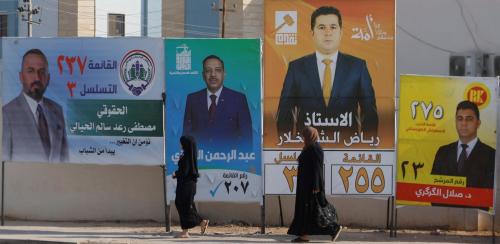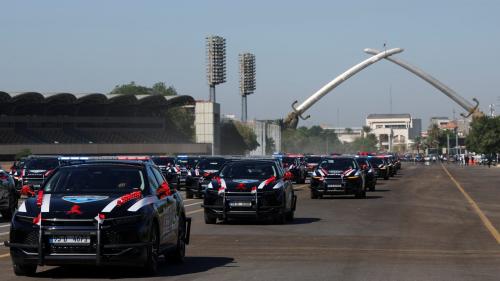The draft Iraqi Constitution, which for months has been the best hope of pulling Iraq out of its cycle of protracted violence and declining public confidence both there and here, could wind up as the summer’s major setback instead.
Despite many impressive characteristics, it risks doing the unthinkable—exacerbating the bitterness of Iraq’s Sunni Arabs and thereby increasing support for violence among the 20 percent of Iraq’s population most responsible for the ongoing insurgency. There is time before the scheduled Oct. 15 referendum on the constitution to fix some of its flaws.
One important issue is the fate of former Ba’athists. The current draft of the constitution would appear to limit their potential to hold government jobs. In theory, this could apply even to those who joined the Ba’ath Party out of convenience or professional necessity and had nothing to do with Saddam’s reign of terror. But there seem to be grounds for compromise here, with Shi’ites and Kurds already acknowledging the difference between those of Saddam’s inner circle and the hundreds of thousands of other Ba’athists.
Another critical matter is the role of Islam in law. But it does seem allowances will be made for more secular Iraqis who would prefer their legal issues not settled by a sharia-based code—even if it is remains unclear who will choose the court where two parties to a lawsuit disagree over the proper of resolution.
However, the constitution-writing committee left things far worse over the question of regional autonomy—and most specifically, how to apportion Iraq’s oil wealth in the future. Today oil accounts for 98 percent of Iraq’s export earnings. When foreign aid starts to dry up in a few years, it will overwhelmingly be Iraq’s main source of hard currency. He who controls it will control Iraq.
And Sunnis fear the Kurds and Shi’ites seem to have every intention of having that control. Although the constitution’s language is unclear, Kurds and Shi’ites may use it to argue that earnings from any new oil wells accrue to the regional government on whose land the wells sit.
Specifically, while saying Iraq’s oil and gas are the property of the Iraqi people, it distinguishes between old and new wells. As for existing wells, “The resources should be distributed in a fair manner appropriate to the population balance around the entire country, with specific allocations for regions damaged and unfairly neglected under the previous regime.” For future oil exploitation, the federal government is granted a role in developing strategic oil-pumping policy, it is not assured of any resulting revenue. And there have been a number of reports from Baghdad that Kurds and Shi’ites understand this formulation to mean regional governments would keep the earnings from wells built in the future.
Such a construct would be hugely destructive. First, it would immediately invite gamesmanship. An old well can be modernized and redefined as new. Or a new well can be built right next to an old one, pumping oil from the same field, but in a way that keeps the money local and denies it to Baghdad.
Even if the Kurds and Shi’ites avoid such chicanery, someday all wells in Iraq will undoubtedly be “new” relative to 2005. At that time, what will be the economic basis of the Iraqi state?
To be sure, in the intervening decade or two, other industries could have been developed, and Iraq’s dependence on oil exports reduced. But petroleum will still surely remain the state’s dominant economic asset. And very little of it will be found on Sunni Arab land or shared with that sect.
The ideal solution would have been for Kurds and Shi’ites to realize that, whatever their aspirations about autonomy, oil should remain the property of all Iraqis to be shared equitably. In this sense, it is akin to the national army—essential for the country’s well-being and also an important symbol of its cohesion and identity. The second-best solution is for all of those Shi’ites and Kurds planning to run in the scheduled December elections to promise that one of their first items of business will be to pass laws clarifying there is no meaningful distinction between old and new wells in Iraq—and that Iraqi revenues from oil and gas will permanently be shared equally on a per capita basis regardless of where they are generated.
Ironically, though we invaded Iraq to topple one Sunni Arab, Saddam Hussein, it is now time for the U.S. and its international partners to rescue the more general Sunni Arab population. This would not be an act of humaneness or kindness; it would be in our naked self-interest. We cannot leave Iraq without capping the political violence there, and we cannot do that without Sunni Arab help.
From what is known of this draft constitution, despite its many impressive features, it may fail in this single most critical goal.
The Brookings Institution is committed to quality, independence, and impact.
We are supported by a diverse array of funders. In line with our values and policies, each Brookings publication represents the sole views of its author(s).



Commentary
Op-edThe Iraqi Constitution: Potentially Fatal Flaw
September 2, 2005